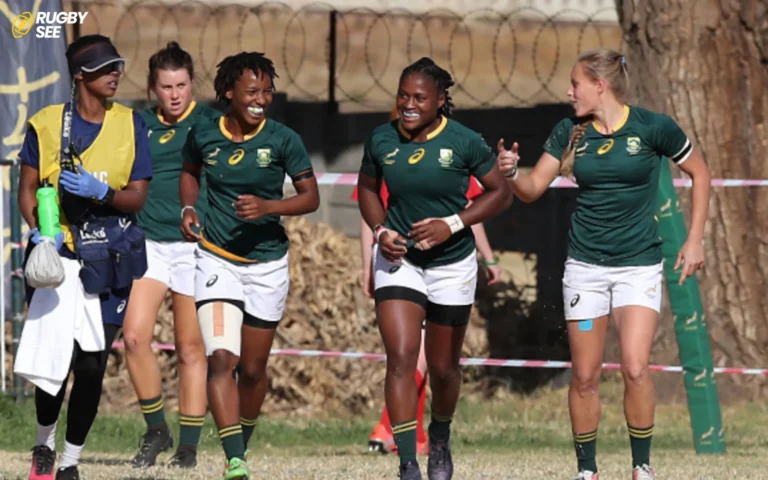Rugby, a game known for its thrilling blend of strength, strategy, and speed, raises a common question for newcomers and fans alike: How long is a rugby match? In this comprehensive guide, we’ll delve into not only the duration of a rugby match but also the factors that contribute to the game’s timing and overall flow.
*For a more comprehensive understanding, be sure to stay with us until the end of the article.
Exploring the duration of a rugby match and the factors influencing its timing.
- The Basics of Rugby Match Duration: Standard rugby matches consist of two 40-minute halves.
- Understanding Time Management in Rugby: The clock may stop for significant events, maintaining the 80-minute playtime.
- Extra Time and Overtime: Additional time is used in knockout games to resolve ties.
- Factors Influencing Match Duration: Various elements like injuries and penalties can extend the match beyond 80 minutes.
- The Halftime Break: A crucial 10-15 minute period used for rest and strategic planning.
- The Role of the Referee in Timekeeping: Referees play a crucial role in ensuring fair play and proper time management.
- Youth and Amateur Rugby Match Lengths: Match duration varies, typically shorter for younger age groups.
- The Impact of Weather and Environmental Conditions: Weather can influence match length due to additional stoppages.
- The Final Whistle: Concluding a Rugby Match: The game ends when the ball is out of play after the full duration.
The Basics of Rugby Match Duration
Standard Match Length: Typically, a rugby match is divided into two halves, each lasting 40 minutes, with a halftime break of about 10 to 15 minutes. This standard duration applies to most professional and international rugby matches, including those in tournaments like the Rugby World Cup and Six Nations.

Understanding Time Management in Rugby
Stoppage Time: Unlike some sports, the clock in rugby doesn’t stop for every interruption in play. However, the referee can stop the clock for significant stoppages like injuries or for important decisions. This aspect ensures that the actual playing time remains close to 80 minutes and if you want to know about Rugby,s popularity read Why Do People Love Rugby.
Extra Time and Overtime
Handling Ties: In some rugby matches, particularly in knockout stages of tournaments, extra time is used to resolve ties. This extra time usually consists of two 10-minute halves. If the tie persists, some formats employ sudden death or a kicking competition to determine the winner.
Factors Influencing Match Duration
Varied Phases of Play: Rugby matches can extend beyond the standard 80 minutes due to various factors like injuries, stoppages for penalties, and Television Match Official (TMO) reviews. The flow of the game, including the number of scrums, lineouts, and penalties, can also impact the overall duration.
The Halftime Break
Purpose and Activities: The halftime break in rugby is not just for rest but also for strategic planning. Teams use this time to reassess tactics and make necessary adjustments. This break is crucial for maintaining the intensity and quality of play in the second half.
The Role of the Referee in Timekeeping
Maintaining Fair Play: The referee plays a vital role in managing the time in a rugby match. They ensure the game flows smoothly, make decisions on stoppages, and monitor the overall duration, keeping the integrity of the match’s timing.

Youth and Amateur Rugby Match Lengths
Adaptations for Different Levels: In youth and amateur rugby, match lengths can vary. Younger age groups typically have shorter matches, ranging from 20 to 30 minutes per half, to accommodate the players’ endurance and skill levels.
The Impact of Weather and Environmental Conditions
Playing in Different Climates: Weather conditions can influence the length of a rugby match. Extreme weather like heavy rain or heat can lead to additional stoppages, impacting the total duration of the game.
The Final Whistle: Concluding a Rugby Match
End of Match Procedures: At the end of the standard playing time, the game doesn’t always stop immediately. The play continues until the ball goes out of play or an infringement occurs, at which point the referee blows the final whistle.
Understanding how long a rugby match is involves more than just knowing the standard 80-minute duration. It encompasses an appreciation of the game’s flow, the role of the referee, and the various factors that can extend or shorten the actual playtime. Rugby’s dynamic nature makes each match a unique experience, with its duration playing a key role in the excitement and unpredictability of the game.
Rugby, a sport known for its physicality and dynamic nature, is played across the globe under a variety of weather conditions. The impact of weather on rugby matches cannot be overstated, as it significantly influences not only the gameplay but also the strategies employed by teams. In this article, we will explore the extent to which weather affects rugby matches, considering factors such as rain, wind, and temperature, and how teams adapt to these challenges.

The Influence of Rain
Rain is perhaps the most impactful weather condition in rugby. Wet conditions lead to a slippery ball and playing surface, which can dramatically change the pace and style of the game. Handling becomes more difficult, leading to more knock-ons and fumbles. As a result, teams often resort to a more conservative style of play, relying heavily on their forwards to gain ground through short, controlled movements rather than expansive backline plays.
Furthermore, rain affects the kicking game. The ball travels less distance when kicked, and controlling its direction becomes more challenging. Players need to adjust their techniques accordingly, focusing on securing possession rather than making ground.
Wind’s Role in Gameplay
Wind can be a game-changer in rugby. It influences the game’s strategic aspects, particularly kicking. A strong wind can dictate the direction of play, with teams preferring to have the wind at their backs to gain an advantage in territory. High winds can also affect the accuracy of passes and kicks, forcing teams to adapt their strategies, often opting for a ground game to maintain control of the ball and if you want to know the reason that Rugby is effectfull for your health read Why is Rugby Good for Your Mental Health.
The Impact of Temperature
Temperature affects rugby matches in various ways, particularly regarding player performance and safety. High temperatures can lead to fatigue, dehydration, and heat-related illnesses, affecting players’ stamina and concentration. Conversely, cold weather can lead to muscle stiffness and an increased risk of injuries. Teams must prepare for these conditions through proper hydration, warm-up routines, and strategic substitutions to keep players fresh.
Adaptation and Strategy
Understanding and adapting to weather conditions is crucial for rugby teams. Coaches and players must be adept at changing their game plans based on weather forecasts. This might include altering their starting lineup to include players who excel in wet conditions or adjusting their tactics to focus on possession rather than expansive plays in windy or rainy conditions.
In preparation for adverse weather, teams also focus on skills that become crucial under such circumstances. For example, practicing ball handling in wet conditions or working on kick accuracy with the wind can give a team a competitive edge.
The Psychological Aspect
Weather conditions also have a psychological impact on players and teams. Playing in poor weather conditions requires mental toughness and resilience. Teams that can maintain their focus and adaptability in the face of adverse weather often have a psychological advantage over their opponents, who may become frustrated or demoralized.
The weather significantly affects rugby matches, influencing not just the physical aspects of the game but also the strategies and mental resilience of teams. Adaptability, preparation, and understanding the nuances of how different weather conditions impact the game are crucial for success in rugby. As climate patterns evolve and extreme weather events become more common, the ability of teams to adapt to and plan for a variety of weather conditions will increasingly become a critical factor in their overall performance and success.
In essence, weather conditions add another layer of complexity to rugby, making it a sport where adaptability, strategy, and resilience are just as important as physical strength and skill. Whether it’s battling through the mud and rain or adapting to the sweltering heat, rugby truly is a sport for all seasons, challenging teams to overcome not just their opponents but also the elements.











One Response
thanks sophia